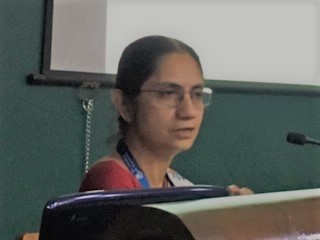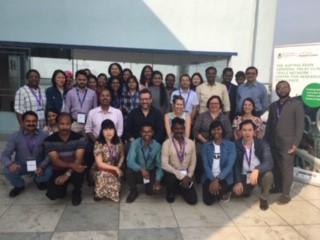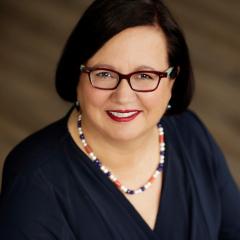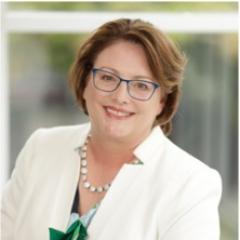With support from the Cerebral Palsy Alliance and The University of Queensland ‘Global Strategy and Partnerships Seed Funding Scheme’, UQ’s Dr Katherine Benfer and Prof. Roslyn Boyd led an 8-day education program in Kolkata, India, 28th November to 6th December 2019.

As the first conference to implement training on the early detection of CP and early intervention using the LEAP-CP program “Learning through Everyday Activities with Parents” across the SAARC (South Asian Association for Regional Cooperation) countries, the event was held in central Kolkata at the SSKM Hospital. With local coordination by Mr Asis Ghosh at the Indian Institute of Cerebral Palsy, the event attracted over 70 attendees both in person and via teleconferencing. The symposium united six SAARC nations (India, Sri Lanka, Vietnam, Bhutan, Nepal and Bangladesh) in an evidence-based early detection and early intervention program which implements the first international CPG (Novak 2017).

The conference was opened by the Director of Medical Education, Department of Health, West Bengal Government, Dr Debasis Bhattacharya and Dr Suchandra Mukherjee, Head of Neonatology at the SSKM Hospital / Postgraduate Institute of Medical education and Research in Kolkata. Dr Mukherjee reported on their extensive experience in neonatal follow-up at the SSKM hospital. Involving experts from Australia (The University of Queensland and Queensland Children’s Hospital), India (Indian Institute of Cerebral Palsy, Asha Bhavan Centre, Dr BC Roy Postgraduate Institute of Paediatric Sciences, Indian Institute of Technology Kharagpur, Child In Need Institute), and Italy (General Movements Trust), the symposium began with a full 3.5-day General Movements Assessments training (conducted by A/Prof. Andrea Guzzetta, GMs Trust), a Hammersmith Infant Examination Assessment training (conducted by Carly Luke, Paediatric Physiotherapist, Queensland Children’s Hospital, CP Alliance PhD Scholar), and an interactive workshop on delivering ‘Learning through Everyday Activities with Parents of infants with Cerebral Palsy (LEAP-CP)’ program (conducted by Dr Katherine Benfer and Prof. Roslyn Boyd).
Specifically, the symposium focused on:
- Early detection using two gold standard CP screening tools (General Movements and Hammersmith Infant Neurological Examination);
- Early intervention principles and techniques for infants at high risk of CP;
- LEAP-CP program content and service delivery model, and introduction to the UQX training platform;
- Practical implementation workshops for early detection and delivering LEAP-CP;
- Early assessment and early intervention for infants with Cerebral Visual Impairment and CP.
We were joined by an expert in the early assessment and intervention of children with Cerebral Visual Impairment, Dr Linda Lawrence from the University of Kansas, USA. Very early detection of CVI in infants at risk of CP is a much needed area of training with reports of >50% CVI in some local cohorts. The teams from each country worked together on developing an early detection strategy to reduce the age of identification of infants at risk of CP, and preparation for implementation of the LEAP-CP program in their own countries.
The symposium aimed to enhance the visibility, research collaborations and organisational partnerships of The University of Queensland in the Indian Sub-Continent, particularly in the health sector. India accounts for a large number of university enrolments (second largest after China at UQ), and the health field is experiencing significant growth.
Sponsored by both the Cerebral Palsy Alliance and The University of Queensland, the symposium offered 26 travel scholarships to encourage attendance of strategic leaders and health professionals from the SAARC countries to attend, enhancing global connections and preparing for implementation of LEAP-CP Early Detection and Intervention Programs across six countries under the banner of UQ and the CP Alliance.
.



